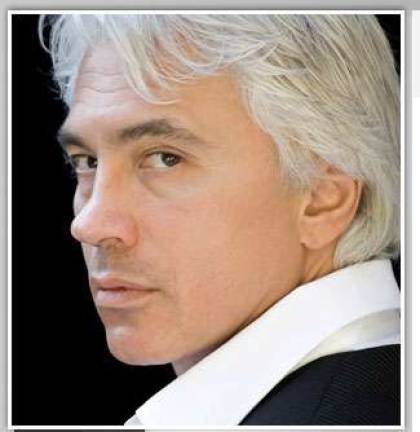Classical Rock Stars

Nights with Gustavo Dudamel and Dmitri Hvorostovsky
When Gustavo Dudamel took the stage at Avery Fisher Hall, the crowd screamed and screamed. He is a "rock star," as everyone says-a rock star of the classical scene. On this night, the Venezuelan conductor led his Los Angeles Philharmonic.
They opened with a piece by Claude Vivier, a Canadian who died in 1983, when he was only 34 years old. He was murdered by a prostitute he had met in a bar earlier that night. We heard Zipangu, a work for chamber orchestra, strings only. It is meant to have an Asian flavor.
The piece starts out scratchy and whiny, and remains that way for a long time. This is one of those bleakscapes. There is a drone, as in a bagpipe (not an aerial zapper). For a while, Zipangu threatens to be a parody of modernism. It builds interestingly toward the end, however, and concludes with an affirmative tonality: strong, unison E's. Dudamel and the orchestra brought off the piece with admirable commitment.
Then came a canonical work, Debussy's La Mer. The orchestra played very well. But the music did not quite sound like itself. It was a little blunt, a little loud, a little un-French. The third movement, "Dialogue of the Wind and the Sea," was without its yearning and mystery.
After intermission, there was another canonical work, Stravinsky's Firebird-not a mere suite, but the whole ballet. Again, the orchestra played very, very well. The L.A. Phil. is a slick band, with a nifty flute and a surefooted horn. (Surefooted horns are worth their weight in gold.) The music was kaleidoscopic, as it should be. But it was also, again, a little loud and blunt. The Firebird should be magical, spine-tingling, thrilling. In these hands, it was frankly a little dull.
But the crowd screamed afterward, which was nice: Classical music could use the commotion, people say.
Another night, another rock star-this one Dmitri Hvorostovsky, the Russian baritone, the "Siberian tiger," as I have long called him. He gave a recital at Carnegie Hall. When he took the stage, it was with his usual mixture of swagger and strut. The crowd went wild. He flashed a smile-many smiles-and his lapels sparkled. There is some Vegas in Hvorostovsky.
On the first half of his program, he sang eleven Rachmaninoff songs, but not the most famous one-the one we know in English as "In the Silence of the Secret Night." Hvorostovsky is a versatile singer. He is distinguished in Verdi roles, for example. But he is most at home in his native repertoire. The voice is alive, and the words fit his tongue. He gave no less than a clinic in how to sing Rachmaninoff.
His pianist, Ivari Ilja, was an equal partner. Rachmaninoff was maybe the greatest pianist of his day, and he does not scant the piano in his songs. I have often remarked on Ilja's formal and endearing manner onstage. He is of the old school. On this night, the page-turner was a woman, and whenever the three of them left the stage-singer, pianist and page-turner-Ilja could not bear to precede her through the door.
The second half of the program consisted of songs from Petersburg, a collection by Georgy Sviridov (1915-98). Setting poems by Aleksandr Blok, the songs are smart, appealing and sometimes moving. Hvorostovsky sang them with soul, in addition to his technique and other gifts.
He has some fun with the audience as they scream for him. A lady approached the stage tentatively, with flowers. Hvorostovsky gestured to himself as if to say, "For me?"
His first encore was the Rachmaninoff song he had left out, the one we had perhaps been waiting for. It has a long, long, beautiful last line. Some singers take it with two breaths. Hvorostovsky took it with one, and he could probably have sung it twice, on that one breath-slowly. In a public interview with me some years ago, Renée Fleming said, "We think he has a third lung."
He bade goodnight as he customarily does-with an unaccompanied Russian folk song. You can hardly help thinking, "Here is an authentic voice of Russia, rising right from the soil."
It's kind of easy to make fun of Hvorostovsky: the hair, the glam, the rock-star strut. But when all is said and done, and image is out the window, he is a great baritone, one of the best singers of our time.